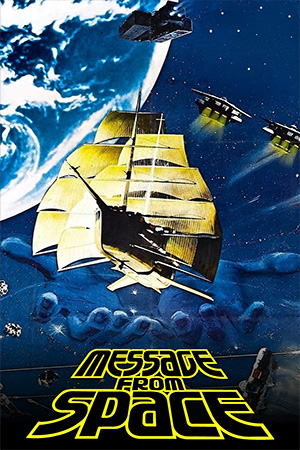Big-budget Japanese post-apocalyptic film ‘Virus’, based on the book by Sakyo Komatsu, is the perfect example of how a butchered, heavily-edited cut of a film can pretty much destroy its reputation. Arriving in the West with a good hour edited out (I remember half-watching the 95-minute Public Domain version on UK television a few years ago), what was once one of Japan’s most expensive films ever drifted into obscurity. Thankfully, the original 155-minute version has gained a wider audience in recent years and now viewers can truly immerse themselves in some real 1980’s pessimism.
A stolen, man-made virus, MM88, is accidentally leaked after an exchange between American Intelligence officers and the East German scientist who helped develop it is interrupted by the police. News of the potential disaster is silenced by officials on both sides of the Cold War divide and this newly labelled ‘Italian Flu’ begins to become a worldwide pandemic. As millions die and governments fall, the only slim hope is a scientific outpost in Antarctica, the virus being found to be dormant in extremely cold temperatures. However, the multinational society that resides at the outpost has their own challenges as others try to join the commune. There’s also the spectre of an activated Automatic Reaction System that threatens to launch nuclear weapons against perceived enemies in a disaster, something utilised by what remains of the US and Soviet Union. The race is on to send a team to deactivate the device, though the journey is a virtual death sentence for whoever goes.
As a child of the 80s, I have a morbid fascination with End of the World films. And no era presented these in such a stark, soul-crushing way as the 70s and 80s. My ranking system, based on the most truly hopeless and depressing efforts, has always had the traumatising ‘Threads’ at the top of it; no film has quite had the impact on me as that has had before or since. While ‘Virus’ isn’t quite up there with the 1984 BBC classic, it nestles very nicely with some esteemed company, namely the sobering ‘Testament’, heart-breaking ‘When the Wind Blows’ and distressing ‘Letters from a Dead Man’. These are not easy viewing nor are they exploitative horror, but fairly realistic dramas based on a very real worst-case scenario. ‘Virus’, deserves its place among this dubious crowd; it’s essential, however, to watch the full Japanese version as anything less is a crime.
‘Virus’ is eerily prescient in certain areas, adding to its power. However, one of the great strengths of the film is how intelligently it tackles the subject and how well the cast is used. Western casts have rarely been so extensively as they are here, but nor have they ever been utilised quite so well. The Japanese and American sides of the story are equally strong and when the two sub-plots combine, they do so flawlessly. The international print, which cut most of the Japanese drama out, does a disservice to the director’s work; the scenes with Japan collapsing are raw and unforgettable, uncompromising in a very 80s way (see some of the aforementioned titles for further evidence. What ‘Virus’ nails so very well is that quiet dread, that encroaching fear that the worst is around the corner. It dovetails expertly with some of the more shocking scenes.
Another important feature with ‘Virus’ is that the dialogue-heavy scenes and long stretches where characters plan what to do next are just as enthralling as the more powerfully visceral scenes. There is something fascinating about how society continues after such a dreadful disaster and the fact that director Fukasaku allows these moments to breathe is to the film’s credit. The closing hour, where the focus is on a potential nuclear backlash, is probably the weakest part of the film; it’s tense in itself, but almost seems tacked on. The book this is based on probably has much more scope to be able to deal with this storyline, but even in a two-and-a-half hour film, it appears unnecessary. The closing frames, sobering as they are, also leave the viewer with some major questions.
You will probably have to be in a certain mood to watch a film as pessimistic as this, but the reward is an excellent piece of entertainment with plenty of food for thought. Needless to say, I am delighted that I gave this film a reappraisal.






